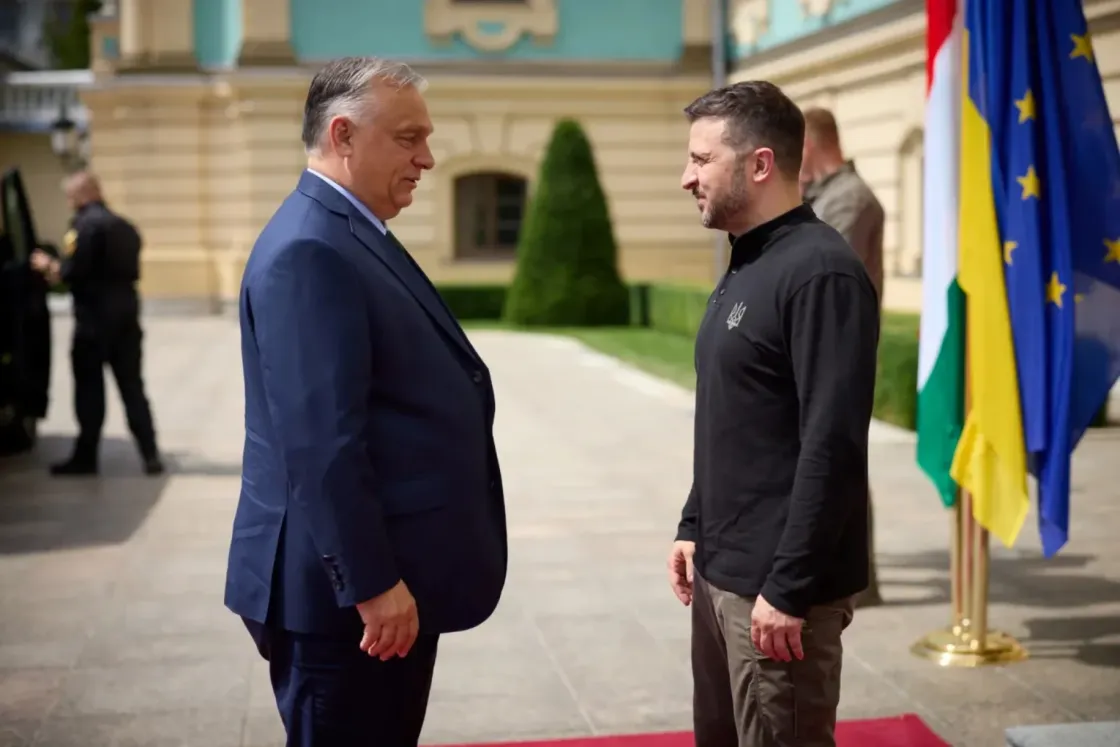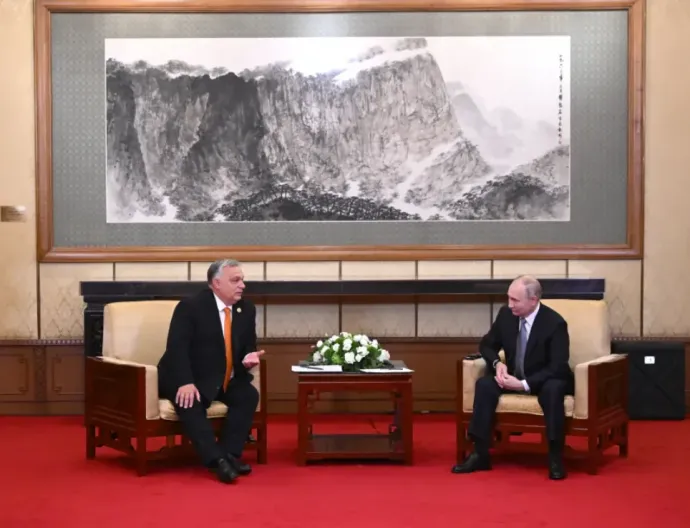Kyiv trip may bring Orbán closer to Zelensky without having to give up good Russian relations

"During the talks in Kyiv, Viktor Orbán argued for immediate peace, the way its described in all Russian 'peace plans', but he did not push too hard" – this is how Ukrainska Pravda assessed the Hungarian Prime Minister's bilateral talks with Ukrainian President Volodymyr Zelensky, whom he visited as almost the last of the EU heads of government, 28 months after Russia launched its invasion of Ukraine.
The meeting was organised in strict confidence at the request of the Hungarian side, and no official report was published until the very last minute. This was partly for security reasons, but it could also be linked to Ukraine's relations with Hungary being the tensest of its relationships with Western countries, and the Orbán government's policy towards Kyiv has been frosty for ten years, but the real stakes of this became high after Russia attacked the entire territory of Ukraine on 24 February 2022. In doing so, it turned what was already a fairly significant armed conflict – since in 2014 it already involved an occupation, the annexation of Crimea and support for the breakaway states in eastern Ukraine – which was mostly localised until then, into a real war. More on the background of the Kyiv trip and the evolution of Hungarian-Ukrainian relations can be found in this summary.
Over the past two years, Fidesz' rhetoric and pro-government media have been hostile towards Zelensky and the policies of Western countries that have helped Ukraine's defense with military supplies, and have also been critical of the sanctions against Russia – without Orbán having vetoed them in the European Council.
In this context, Orbán's Tuesday visit is a milestone, firstly because it took place in Kyiv, secondly because it marked the first bilateral meeting between the two countries in five years since the election of Zelensky, and thirdly because of what was said at the joint press conference after the talks. The press conference itself is an important gesture, and diplomatic sources were not sure until the last minute whether the two leaders would be addressing the press.
Orbán had to show solidarity for ten minutes
But it did happen – even if it was only for ten minutes, without any questions from journalists – and here Orbán spoke about Zelensky in a way he had not done before. He praised, for example, "the Ukrainian president's efforts for peace" – a striking contrast with the picture the government has painted so far, blaming Zelensky and the West rather than Russian President Vladimir Putin who started the war, for guns being fired and for the lack of peace talks.
When it comes to appearances and much of the content visible to the public, Tuesday's visit was quite similar to what it has looked like when a leader of a country in solidarity with Ukraine has met with Zelensky, which in itself is a big change from the way Gergely Gulyás, the Prime Minister's Office Minister, spoke just three weeks ago. He said that he was not aware of any subject on which Orbán and Zelensky could agree and that a meeting just for the sake of photographers would be pointless.
The talks were more than just a formality because this time it was important for both sides: for Ukraine to settle the objections raised by the Hungarian government regarding the laws on the use of the Hungarian language by the ethnic minority living in Ukraine – and Kyiv is willing to do so, according to a government statement last week based on the 11-point demand handed over by Péter Szijjártó to the Ukrainian Foreign Minister in January. And it was important for Orbán, because he took over the presidency of the Council of the European Union on Monday. His other reason is that the EU-sceptic parties emerged weaker than expected after the EP elections, and he could not allow Fidesz' potential alliance with some of them to become unviable, given that they were rejected by the group they originally had their eyes on, on account of the Hungarian government's policy towards Ukraine. Orbán is currently working hard to form a new parliamentary group in the EP.
At the press conference, however, Orbán also spoke about the ceasefire, which Ukrainian newspapers highlighted. "The rules of international diplomacy are slow and complicated. I asked the President to consider whether the order could be reversed and a quick ceasefire could speed up the peace talks. A time-bound ceasefire, which would allow speeding up the peace talks: I have explored the possibilities of this," Orbán said, according to the Hungarian Press Agency, MTI.
"Peace is a very important issue. The war in which you are living has a very intense impact on the security of Europe," Orbán added, according to reports by Unian, adding that he was "very grateful to Zelensky for his frank answer on this matter." Exactly what the response was is not clear from the reports, but Kyiv's position on the subject is well known: in the current situation, a ceasefire would only give Russia time to reinforce its defences in the occupied territories and then attack with renewed force.
Zelensky said that he and Orbán discussed fundamental issues of trade, cross-border cooperation, infrastructure and energy between the two neighbouring countries. "Everything that affects the lives of the people of Ukraine and Hungary, including the opening of the first Ukrainian school in Hungary," Unian quoted Zelensky as saying, adding that the current talks could also provide a good basis for an agreement between the two countries.
Orbán can certainly reduce the European isolation of the Hungarian government with the meeting in Kyiv, while at the same time, he can say that he has been successful in having the Ukrainian education law – which is indeed objectionable in the parts related to the Hungarian minority's use of their language – amended.
In the months leading up to the meeting, Orbán also settled his relations with NATO: in February, the Hungarian Parliament was the last to ratify Sweden's accession, and in June Orbán agreed with Jens Stoltenberg that Hungary would not participate in NATO's programme to help Ukraine with training and funding, but would not be obstructing it either. There has been no legal obstacle to this before either, so the NATO Secretary General's visit to Budapest was more of a political settlement of tensions. This was reinforced by the fact that, despite all his previous objections, Orbán finally agreed to support Mark Rutte, the Dutch ex-Prime Minister nominated to succeed Stoltenberg as NATO Secretary General.
Orbán must have already signalled to Putin
Despite the sanctions, the Hungarian government has ensured that imports of Russian energy resources to the country continue as before, thereby ensuring that Moscow continues to see Hungary as a key partner, which is present on the Kremlin's political radar well beyond its actual weight. This is also true for NATO and the EU, pretty much the way Orbán put it on the 50th anniversary of the founding of the Hungarian Institute of Foreign Affairs, when he described his foreign policy as radical.

It is likely that Moscow received a political signal a while ago that Orbán would be slightly changing his rhetoric. This may have been done through Péter Szijjártó, who regularly meets with Russian Foreign Minister Sergey Lavrov – and the Hungarian Minister for Foreign Affairs and Trade also spoke with Lavrov during Orbán's trip to Kyiv.
However, the timing of the call was also a signal. According to the Russian Foreign Ministry's website, the call was initiated by the Hungarian side, and the statement said that the parties appreciate the level of Russian-Hungarian political dialogue and see bilateral cooperation as progressively developing "in the spirit of healthy pragmatism and to mutual benefit".
It's also possible that Orbán did it himself when he sat down for talks with the Russian president in Beijing last October – the only EU leader to do so since Vladimir Putin launched war against Ukraine. In the public part of that meeting, Orbán said: "Mr President, you know what Hungary is like, what its possibilities are. What we can do today, we will do. We are saving everything we can from our bilateral relations. It is in our interest to maintain cooperation not only at the level of exchange of ideas but also at the level of the economy, as long as we can" – Orbán has done so, which, as his speech at the end of last year indicated, Putin appreciated.
The Kremlin spokesman also expressed appreciation for this on Tuesday, the day of the meeting:
According to Dmitry Peskov, the Kremlin expects nothing from the visit, and as they see it, Orbán was not so much present as the head of government of his own country, representing national interests, but rather as the leader of the country holding the EU presidency, representing the interestes of Brussels and fulfilling his obligations pertaining to this role. Peskov said so although both the Hungarian side and the Ukrainian side talked about bilateral relations.
Based on all this, it seems that Tuesday's meeting in Kyiv could open the doors to the West for Orbán without him having to close the doors to Russia, which have been left ajar.
For more quick, accurate and impartial news from and about Hungary, subscribe to the Telex English newsletter!